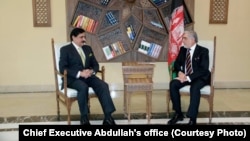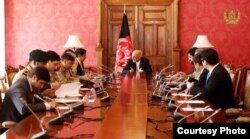Pakistan has conveyed to the leadership in Afghanistan its opinion that the Taliban are left with no “excuse or justification for continuing war” following Kabul’s offer of unconditional peace talks.
Islamabad’s National Security Adviser, Nasser Janjua, delivered the message during a daylong official visit Saturday, where he assured Afghan leaders of Pakistan’s “complete support" for the “long awaited” peace offer made by President Ashraf Ghani.
“He termed the peace offer as a light on the other side of the tunnel in a war which had become rather perpetual,” a post-visit statement issued Sunday quoted Janjua as telling Ghani.
The Taliban has not yet publicly responded to the offer, however, prompting expectations the insurgents are weighing whether or not to come to the negotiating table, Pakistan and U.S. officials said.
Ghani in his meeting with the Pakistani delegation emphasized the need for the two countries to work together to improve bilateral relations under a “comprehensive engagement” and sought Islamabad’s support for bringing an end to the Afghan conflict, the statement said.
“Seeking the closure of [the Afghan] conflict instead of winning it is a righteous approach…Our peace is mutual, lets seek it together,” Janjua told the Afghan president.
The Pakistani adviser underscored the need for the two sides to desist from indulging in a blame game and called for both the countries to commit to each other and invest in the bilateral relationship.
The Afghan president handed over a letter of invitation to Janjua for Pakistan's prime minister, and expected him to visit as soon as possible, according to Sunday’s statement.
Janjua also held separate meetings with Chief Executive Abdullah Abdullah, Afghan National Security Adviser Haneef Atmar and the head of the Afghan spy agency.
Afghan and American officials have long accused Pakistani security institutions of harboring Taliban sanctuaries and covertly supporting its allied Haqqani network of militants, charges Islamabad rejects.
Pakistani military and civilian leaders speak of a renewed effort they are making to use “whatever influence” Islamabad has over Afghan insurgents to push them to the negotiating table.
They credit Pakistan’s “sincere” push to help jump-start an Afghan peace and reconciliation process for a recent improvement in the usually mistrust-marred relations with Kabul and Washington.
U.S. Vice President Mike Pence Friday hosted Pakistani Prime Minister Shahid Khaqan Abbasi in Washington and underlined the need for the two countries to work closely for regional stability and in fighting terrorism.
“Vice President Pence reiterated President Trump's request that the Government of Pakistan must do more to address the continued presence of the Taliban, Haqqani Network, and other terrorist groups operating in their country,” said a White House statement issued after the 30-minute meeting.





